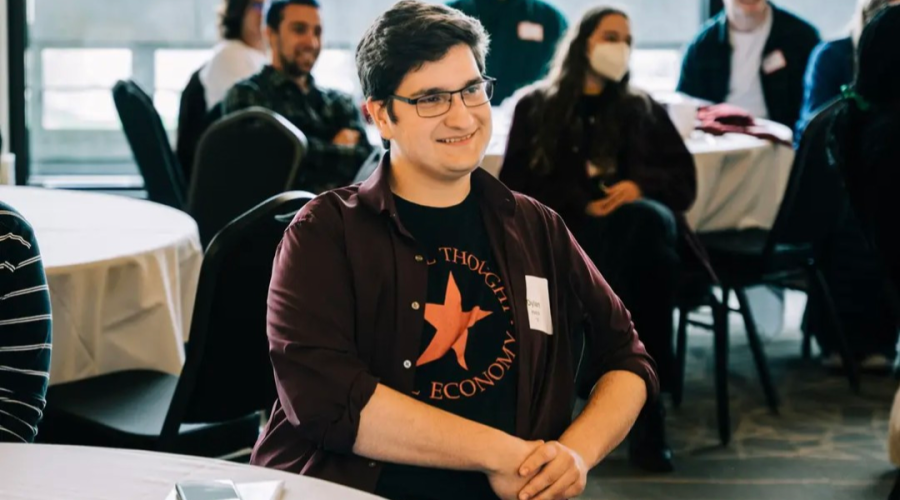
One M.S. Degree, Two Passions
What attracted Dylan Hatch M.S. ’25 to the ILR M.S. program was that it would allow him to combine his passions, and he has now graduated with enhanced qualifications for doing research to support justice in the labor movement.
What experiences led to your time at ILR?
My interest in labor studies began as an undergraduate in the Social Thought and Political Economy program at UMass Amherst. Through my courses and internships with worker-owned businesses, I realized the importance of a democratic economy not only to workers’ rights but to a healthy society at large. Courses in labor studies at UMass helped me understand that the labor movement is the primary institution for enacting economic democracy.
What motivated you to join the M.S. program?
When graduating with my B.A., I was torn between pursuing my passion for research (via academia) versus being directly in the struggle for social and economic justice (via the labor movement). The M.S. program stood out as a solution to combine these goals by training me to use my research skills to support workers.
What courses have been especially impactful so far?
Kate Bronfenbrenner’s Introduction to Labor Research course shaped my understanding of strategic corporate research. By teaching us about the role of research in union campaigns, it opened my eyes (and technical toolkit) to the ways we can use our research to most effectively support the labor movement.
I’ve also learned a great deal from the labor sociologists in the department. Andrew Wolf’s course on labor process theory, Assembly Lines to Algorithms, taught me how to conceptualize the organization of work amid technological change – a particularly important concept given the rise of AI. Devin Wiggs’ course on the welfare state also helped me understand how labor fits into the complex relationship between economic systems and the state.
What about the M.S. experience has been surprising?
The flexibility within the program has been a very pleasant surprise. Many master’s programs seem strict in their requirements, and I honestly expected the ILR M.S. program to be the same. Although the program requires us to take some basic courses (which ended up being some of my favorites) and write our thesis, we have a great amount of flexibility to tailor our experience around our interests and goals. This aspect, combined with similar flexibility in our thesis, made me feel in control of my education while having the resources, support, guidance and expertise of the ILR School at my disposal.
Where do you hope the M.S. program takes you in your career?
Immediately after graduating, I’m starting a position as a Business Agent for the New England Joint Board of UNITE HERE. I feel better qualified for the position from my training in labor studies in the M.S. program. Long term, I’m hoping to lean more heavily into research, either as a full-time researcher for a union or as a professor of sociology. Either path (including my position with UNITE HERE) will build on the skills and knowledge I gained in the M.S. program.
What are your thoughts for those considering the M.S. program?
The labor movement is more important now than ever, and its significance will grow exponentially in the coming years. If you’re passionate about social and economic justice, now is the time when workers need a strong labor movement the most. Strategic research is a unique and exciting way to support workers, especially for those with a background in research as an undergraduate. Some programs train in labor studies, and some focus on policy research; however, no program has the curriculum and vast resources to train students specifically in strategic research for the labor movement.
In your free time, what do you do for fun?
I’ve enjoyed hiking since being in Ithaca and exploring all the beautiful scenery. I also enjoy playing pickup basketball at the courts and going for walks with my housemates at the Wait Terrace housing cooperative on North Campus. I’ll dearly miss the local waterfalls and community after graduation.